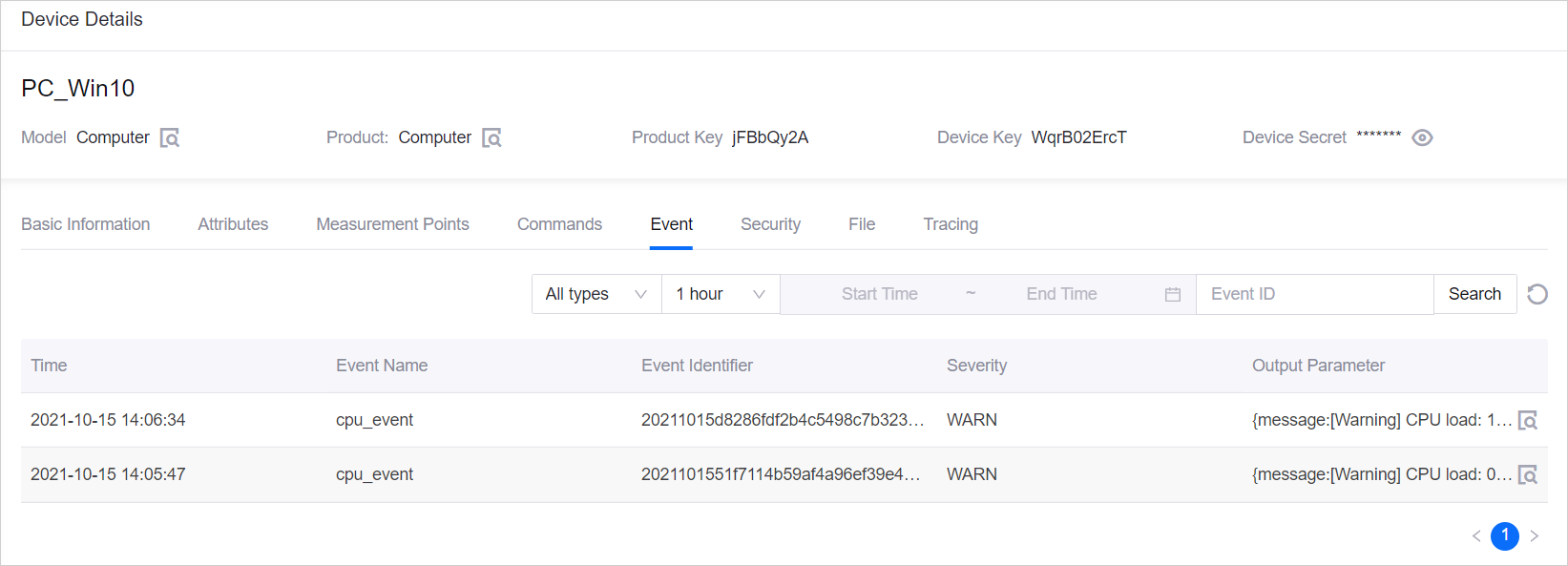Unit 4: Monitoring the CPU Load¶
By extracting PC system data at specified time intervals, you can monitor the CPU load and report CPU load events if the CPU load exceeds the set threshold (for example, 50%).
In this unit, you will add the function of monitoring the CPU load to the program that is used in Unit 3.
Declare the function
monitor()for monitoring the CPU load.public static void main(String[] args) throws Exception { connect(); updateAttribute(); monitor(); }
Program the
monitor()function to upload the PC system data to EnOS Cloud according to the specified interval (for example, every 10 seconds) and monitor the CPU load (for example,cpu_load>0.2).public static void monitor() throws Exception { long lastReportTs=0; while (true) { Map<String, Object> systemInfo= collectDeviceInfo(); postMeasurepoint(systemInfo); double cpu_load= (double) systemInfo.get("cpu_used"); if (cpu_load>0.2) { long ts = System.currentTimeMillis(); if ((ts-lastReportTs)>(60*1000)) { lastReportTs=ts; reportCPULoadEvent(cpu_load, "[Warning] CPU load: "+ cpu_load); }else{ System.out.println("[Warning] No reporting required, CPULoadEvent: " + cpu_load); } } Thread.sleep(interval*1000); } }
Program the
reportCPULoadEvent()function to report the CPU load events if the CPU load exceeds the threshold.public static void reportCPULoadEvent(double value, String describe) { EventPostRequest request=EventPostRequest.builder() .setQos(0) .setEventIdentifier("cpu_event") .addValue("value", value) .addValue("message", describe) .build(); System.out.println(">>> Post Event: "+request); try { EventPostResponse resp = client.publish(request); System.out.println("<-- " + resp); } catch (Exception e) { e.printStackTrace(); } }
Compile and run the program for device connection, data ingestion, and CPU load event reporting.
import java.util.HashMap; import java.util.Map; import com.enosiot.enos.iot_mqtt_sdk.core.ConnCallback; import com.enosiot.enos.iot_mqtt_sdk.core.MqttClient; import com.enosiot.enos.iot_mqtt_sdk.message.upstream.tsl.*; import oshi.hardware.HardwareAbstractionLayer; import oshi.software.os.OperatingSystem; public class Sample { private static final String uri = "tcp://{host}:{port}"; private static final String productKey = "product_key"; private static final String deviceKey = "device_key"; private static final String deviceSecret = "device_secret"; private static MqttClient client; private static int interval=5; // 10s public static void main(String[] args) throws Exception { connect(); updateAttribute(); monitor(); } // Device connection initialization public static void connect() { System.out.println("start connect with callback ... "); try { client = new MqttClient(uri, productKey, deviceKey, deviceSecret); client.getProfile().setConnectionTimeout(60).setAutoReconnect(true); client.connect(new ConnCallback() { @Override public void connectComplete(boolean reconnect) { System.out.println("connect success"); } @Override public void connectLost(Throwable cause) { System.out.println("onConnectLost"); } @Override public void connectFailed(Throwable cause) { System.out.println("onConnectFailed : " + cause); } }); } catch (Throwable var1) { } System.out.println("connect result :" + client.isConnected()); } // Ingesting PC system and hardware data public static Map<String, Object> collectDeviceInfo() { oshi.SystemInfo si = new oshi.SystemInfo(); HardwareAbstractionLayer hal = si.getHardware(); OperatingSystem os = si.getOperatingSystem(); Map<String, Object> data = new HashMap<String, Object>(); data.put("system", os.toString()); data.put("model", hal.getComputerSystem().getManufacturer() + " " + hal.getComputerSystem().getModel()); data.put("cpu_core", hal.getProcessor().getLogicalProcessorCount()); data.put("cpu_used", hal.getProcessor().getSystemCpuLoad()); data.put("mem_total", hal.getMemory().getTotal()); data.put("mem_used", hal.getMemory().getAvailable()); data.put("cpu_used_average", hal.getProcessor().getSystemLoadAverage()); data.put("cpu_temperature", hal.getSensors().getCpuTemperature()); return data; } // Updating PC attributes with the ingested system and hardware data public static void updateAttribute(){ Map<String, Object> deviceInfo= collectDeviceInfo(); System.out.println("Computer info: "+deviceInfo); AttributeUpdateRequest request = AttributeUpdateRequest.builder() .setQos(1) .addAttribute("system", deviceInfo.get("system")) .addAttribute("model", deviceInfo.get("model")) .addAttribute("cpu_core", deviceInfo.get("cpu_core")) .addAttribute("mem_total", deviceInfo.get("mem_total")) .build(); System.out.println(">>> Update Attribute: "+request); try { AttributeUpdateResponse resp = client.publish(request); System.out.println("<-- " + resp); } catch (Exception e) { e.printStackTrace(); } } // Uploading PC system data to EnOS Cloud public static void postMeasurepoint(Map<String, Object> systemInfo) { MeasurepointPostRequest request = MeasurepointPostRequest.builder() .setQos(0) .addMeasurePoint("cpu_used", Double.parseDouble(systemInfo.get("cpu_used").toString())+0.0) .addMeasurePoint("mem_used", systemInfo.get("mem_used")) .build(); System.out.println(">>> Post Measurepoint: "+request); try { MeasurepointPostResponse resp = client.publish(request); System.out.println("<-- " + resp); } catch (Exception e) { e.printStackTrace(); } } // Monitoring the CPU load public static void monitor() throws Exception { long lastReportTs=0; while (true) { Map<String, Object> systemInfo= collectDeviceInfo(); postMeasurepoint(systemInfo); double cpu_load= (double) systemInfo.get("cpu_used"); if (cpu_load>0.2) { long ts = System.currentTimeMillis(); if ((ts-lastReportTs)>(60*1000)) { lastReportTs=ts; reportCPULoadEvent(cpu_load, "[Warning] CPU load: "+ cpu_load); }else{ System.out.println("[Warning] No reporting required, CPULoadEvent: " + cpu_load); } } Thread.sleep(interval*1000); } } // Reporting CPU load events public static void reportCPULoadEvent(double value, String describe) { EventPostRequest request=EventPostRequest.builder() .setQos(0) .setEventIdentifier("cpu_event") .addValue("value", value) .addValue("message", describe) .build(); System.out.println(">>> Post Event: "+request); try { EventPostResponse resp = client.publish(request); System.out.println("<-- " + resp); } catch (Exception e) { e.printStackTrace(); } } }
Check the running result of the program. The program will return the following result if the CPU load exceeds the threshold.
>>> Post Event: AnswerableMessageBody{id='null', method='thing.event.cpu_event.post', version='null', params={time=1565852207454, events={message=[Warning] CPU load: 1.0, value=1.0}}}
The posted events will be shown under the Event tab at the Device Details page.
